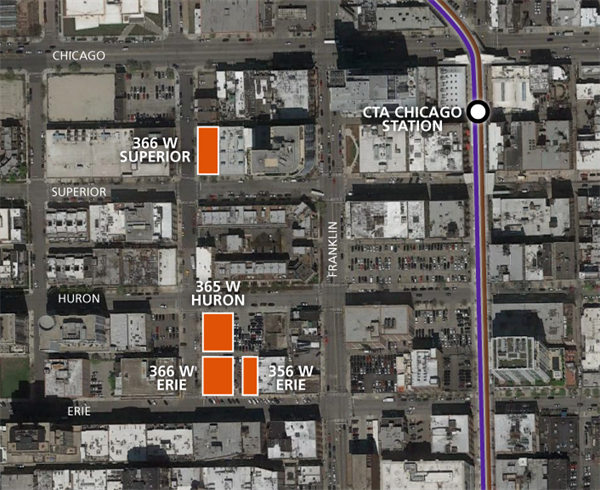
Flickr user clarkmaxwell (cc).
New development in River North would add to the neighborhood's vitality and encourage use of the transit system.
Earlier this month, the City of Chicago announced that it would sell four city-owned parking lots in River North, one of the city’s fastest-growing and most popular neighborhoods. The lots are located within a few blocks of the Chicago Transit Authority “Chicago” station on the Brown and Purple Lines, just north of Merchandise Mart.
Projects on the parking lots could add $358,000 in annual new property tax revenues.
The sale will be good for this year’s city budget, bringing in $12.4 million from three separate buyers—far more than the $7 million appraisal. They will also bring in new tax revenues in the years to come once they are developed, demonstrating how transitioning underused land to productive, transit-oriented use can benefit people and government.
The parcels, three of which are surface lots and one which is a one-story parking garage, were acquired by the City between 1997 and 2005 to serve municipal employees.

But the neighborhood is well served by frequent public transportation, and the fact that the lots were owned by the City and not being developed hurt the municipal tax rolls and the surrounding neighborhood. Indeed, as the lots were publicly owned, they were not subject to property tax and therefore did nothing to help the budget—an important concern in tight times.
The sale of the property will immediately bring in about $150,000 in transfer taxes, which will be distributed primarily to the Chicago Transit Authority but also to the City of Chicago, Cook County and the State of Illinois.
In the longer term, the properties are likely to be developed. With new construction on these lots, significantly more benefits will accrue. The Metropolitan Planning Council’s new Grow Chicago Calculator projects that, if the four parcels are developed to the degree allowed under the local zoning code, they will bring in an additional $358,000 in local property taxes. Current zoning allows about 135 new housing units and 153,000 square feet of development on these sites in total, as the following table shows.
In addition, all the new people living and working in these buildings will contribute to local businesses, buying at local stores and eating at local restaurants. The Calculator shows that these projects can be estimated to add more than $1.4 million to the neighborhood economy once they are completed.
Together, the sale of these properties and their future development will add to the local economy and reduce strain on local budgets. Identifying similar opportunities should be a key goal of local governments in the Chicago region.
|
|
Parcel sq. ft.
|
Zoning class
|
Allowed housing units
|
Allowed built space (sq. ft.)
|
Estimated annual property tax
|
Estimated additional local retail sales
|
|
366 W. Superior
|
7,688
|
DX-5
|
38
|
38,440
|
$101,000
|
$411,000
|
|
365 W. Huron
|
8,428
|
PD 461
|
42
|
58,996
|
$111,000
|
$450,000
|
|
366 W. Erie
|
6,000
|
DX-5
|
30
|
30,000
|
$66,000
|
$269,000
|
|
356 W. Erie
|
5,071
|
DX-5
|
25
|
25,355
|
$80,000
|
$324,000
|
|
Total
|
27,187
|
|
135
|
152,791
|
$358,000
|
$1,454,000
|